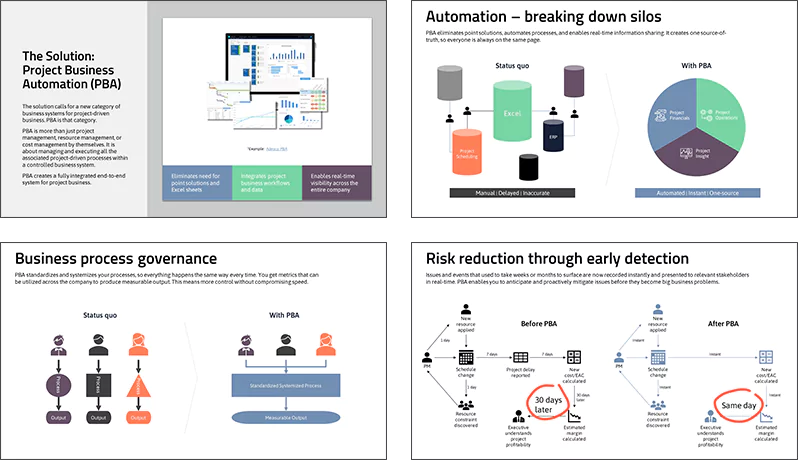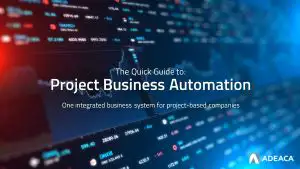In today’s fast-paced business landscape, managing projects efficiently is paramount for success. To streamline and optimize project processes, organizations turn to Project Management Information Systems (PMIS). In this comprehensive guide, we delve into what a PMIS is, its core components, benefits, and its role in modern project management. We’ll also explore the future of project management with Project Business Automation (PBA) and why it surpasses traditional PMIS.
What is a Project Management Information System (PMIS)?
A Project Management Information System (PMIS) is a centralized software solution designed to facilitate project planning, execution, monitoring, and control. It serves as a digital command center for project managers, enabling them to efficiently coordinate resources, track progress, and make data-driven decisions.
Core Components of a PMIS
A robust PMIS comprises several core components, each playing a vital role in managing projects effectively:
Project Planning
PMIS assists in project planning by creating detailed project schedules, defining tasks, setting milestones, and allocating resources.
Document Management
It allows for organized document storage, retrieval, and version control, ensuring stakeholders have access to the latest project information.
Collaboration Tools
PMIS promotes collaboration among team members by providing communication channels, document sharing, and real-time updates.
Reporting and Analytics
Users can generate customized reports and utilize data analytics to gain insights into project performance.
Risk Management
PMIS helps identify, assess, and mitigate project risks by tracking potential issues and proposing solutions.
Resource Management
It enables efficient allocation and tracking of resources, ensuring they are used optimally.
Benefits of Using a PMIS
Implementing a PMIS offers several key advantages for organizations:
- Efficiency: Automation of routine tasks reduces manual efforts, allowing teams to focus on critical project activities.
- Accuracy: PMIS ensures data accuracy, minimizing errors in project tracking and reporting.
- Collaboration: Seamless collaboration among team members fosters better communication and knowledge sharing.
- Decision Support: Access to project data empowers stakeholders to make informed decisions promptly.
- Cost Control: PMIS helps manage project budgets, reducing the risk of cost overruns.
- Scalability: It can scale to accommodate project growth and complexity.
PMIS vs. Project Management Software
It’s essential to distinguish between PMIS and standard project management software. While project management software focuses on individual tasks, scheduling, and resource allocation, PMIS is more comprehensive. PMIS integrates multiple aspects of project management, including planning, collaboration, document management, and analytics, providing a more holistic view of the project.
The Role of PMIS in Modern Project Management
In today’s dynamic business environment, PMIS has become widely used tool. It helps streamline project workflows, enhances communication, and ensures that projects are executed on time and within budget. Moreover, it serves as a centralized repository of project information, fostering transparency and accountability.
Project Business Automation (PBA): the Future of Project Management Information Systems (PMIS)
As businesses continue to evolve, the future of project management lies in Project Business Automation (PBA). PBA takes project and business management to the next level by seamlessly integrating all aspects of project and business operations and financials into a unified system.
Why PBA Surpasses Traditional PMIS
PBA is the first vertically integrated business system for projects. PBA goes beyond information. It manages your entire project business.
Key aspects of PBA
- Holistic Approach: PBA doesn’t just manage projects; it governs project processes end-to-end throughout the project lifecycle. It provides a single, comprehensive platform that standardizes, integrates, and automates core project processes.
- Efficiency and Automation: PBA enhances efficiency through automation, reducing manual efforts and errors. It streamlines project operations, allowing teams to focus on value-adding tasks.
- Real-time Insights: PBA offers real-time insights from a single source of truth. Managers and executives can trust the data because it all originates from the same system, enabling better decision-making.
- Integrated Business and Project Management: Unlike traditional PMIS, PBA integrates business and project aspects seamlessly. It’s designed to meet the specific needs of project-centric organizations.
In conclusion, while PMIS has been a game-changer in project management, the future undoubtedly belongs to Project Business Automation (PBA). PBA’s holistic approach, efficiency, real-time insights, and seamless integration make it the superior choice for organizations seeking to excel in project management and drive overall business success. Explore the possibilities, adopt PBA, and stay ahead in the evolving landscape of project business management.
Project Business Automation (PBA) is a comprehensive solution for project businesses. Learn more: Download the PBA Quick Guide now.












